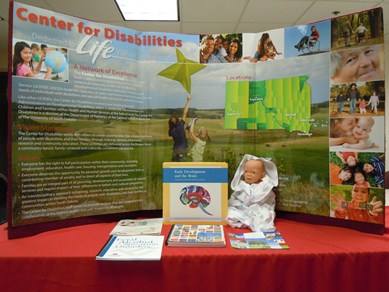Center for Disabilities (SD UCEDD/LEND) Offers Unique Training Approach For Educators Working With Students With Fetal Alcohol Spectrum Disorders
August 27, 2012

|
"This was an awesome training! Such new and useful information," said one of the educators who attended the Fetal Alcohol Spectrum Disorders (FASD) training. "I loved the brain-based information."
The USD Center for Disabilities at the Sanford School of Medicine - located in Sioux Falls, S.D. - provides educators across the state with specific FASD training, empowering the teachers to more effectively plan educational interventions for students identified with an FASD.
Specifically, FASD staff work with South Dakota public school district to provide in-services, trainings and /or curriculum consultation in the area of FASD, including background information of the disorder; identification of children who may have an FASD; and effective learning strategies.
Four separate, day-long trainings (approximately six hours each in length) take place each year across South Dakota, in distinct geographic areas. These trainings include the fundamentals of the disability of FASD with a concentration on brain differences and the effects on executive functioning ability including attention, memory, and behavior.
There is a critical need in South Dakota for broader FASD awareness and training in schools because according to reports, " ... approximately 25% of the pregnant women surveyed indicated drinking alcohol since the date of their last menstrual cycle. This percentage is higher than average rates reported elsewhere and illustrates that the number of children with FASD in the state will unfortunately continue to increase." (Annual Report to Center for Substance Abuse and Prevention for Year 3: Four State Consortium on Fetal Alcohol Syndrome, 2003)
Teachers need to have a specific understanding, knowledge, and training of FASD in order to meet the needs of students with this disability. The behaviors of these students cannot be managed effectively unless there is an understanding of the underlying organic brain dysfunction. When there is an understanding of the underlying brain damage caused by FASD, effective strategies can be used to enhance the student's success in the classroom.
While the aforementioned trainings were more general in scope, the Center for Disabilities does not stop at general training, but also offer a specific, hands-on, multi-faceted array of technical assistance and direct coaching methods for those who commit to the follow-up intensive training.
Two small group intervention programs are provided at geographically different locations in the state for those who are direct service providers to students diagnosed with an FASD. These programs provide a combination of didactics, practice, and applied application as well as quality assurance. Each location has approximately 40 hours of small group didactics and three, two-hour coaching sessions with educators incorporating the skills and techniques within their classrooms and/or schools.
Didactics include prenatal substance exposure as it relates to cognition, communication, and executive functions (behavior, attention, memory, socialization); differentiated teaching methods; environmental adaptations; and IEP development. Small group didactics may also include research and reflection papers submitted by educators for the training.
The following graph highlights the number of trainings from 2011-2012 and the individuals served, but is not indicative of the individuals receiving the second tier, high intensive training.
|
|
|
Participants |
||||
|
FY |
In-service Trainings |
Family members |
*Adults |
**Prof/Para |
General public |
Total |
|
2011 |
20 |
63 |
100 |
354 |
255 |
772 |
|
2012 |
14 |
5 |
2 |
381 |
|
388 |
*Adults = Adults (22+ years old) with disabilities
**Prof/Para = Professionals and paraprofessionals
The trainings have been a success, as evinced by comments from trainees like "We learned a thorough description of what to expect and what NOT to expect from a person with FASD," "The strategies presented will be helpful to all my students, and there were specific ones I will use with targeted student(s)," and "The trainer was fantastic!"
For more information about the USD Center for Disabilities, go to www.usd.edu/cd.







